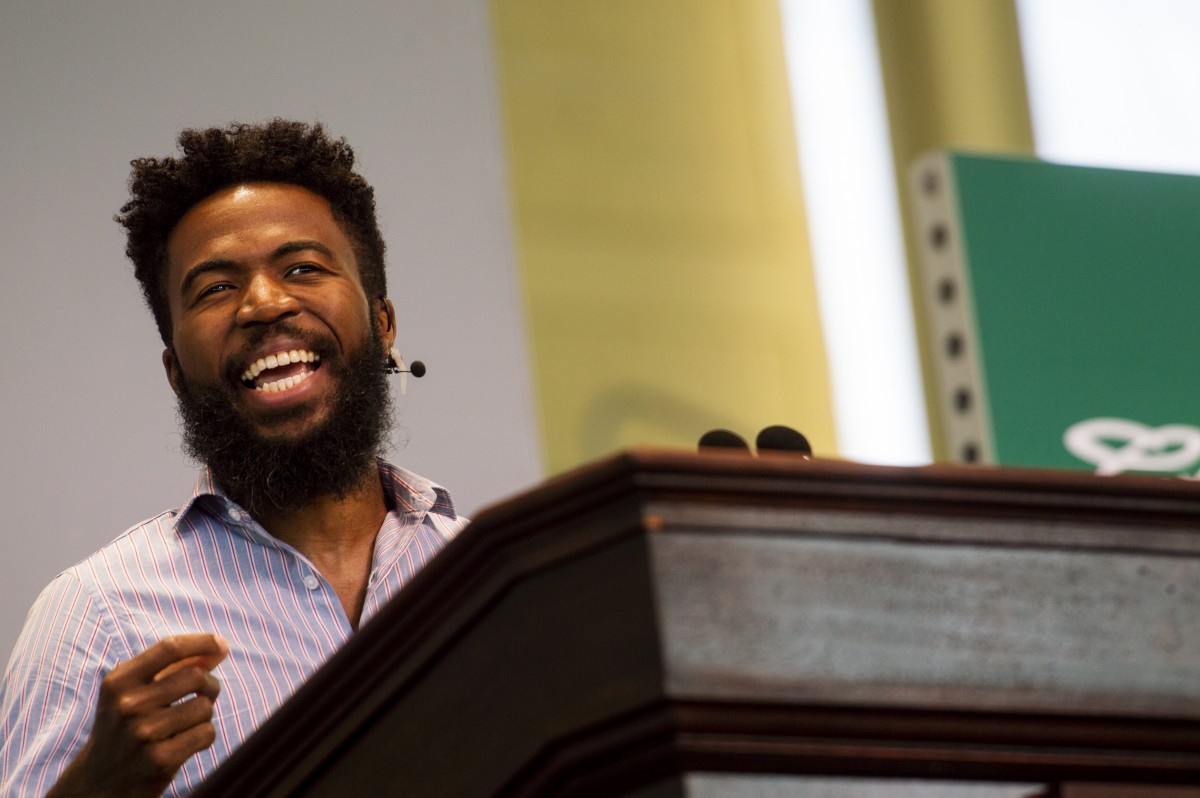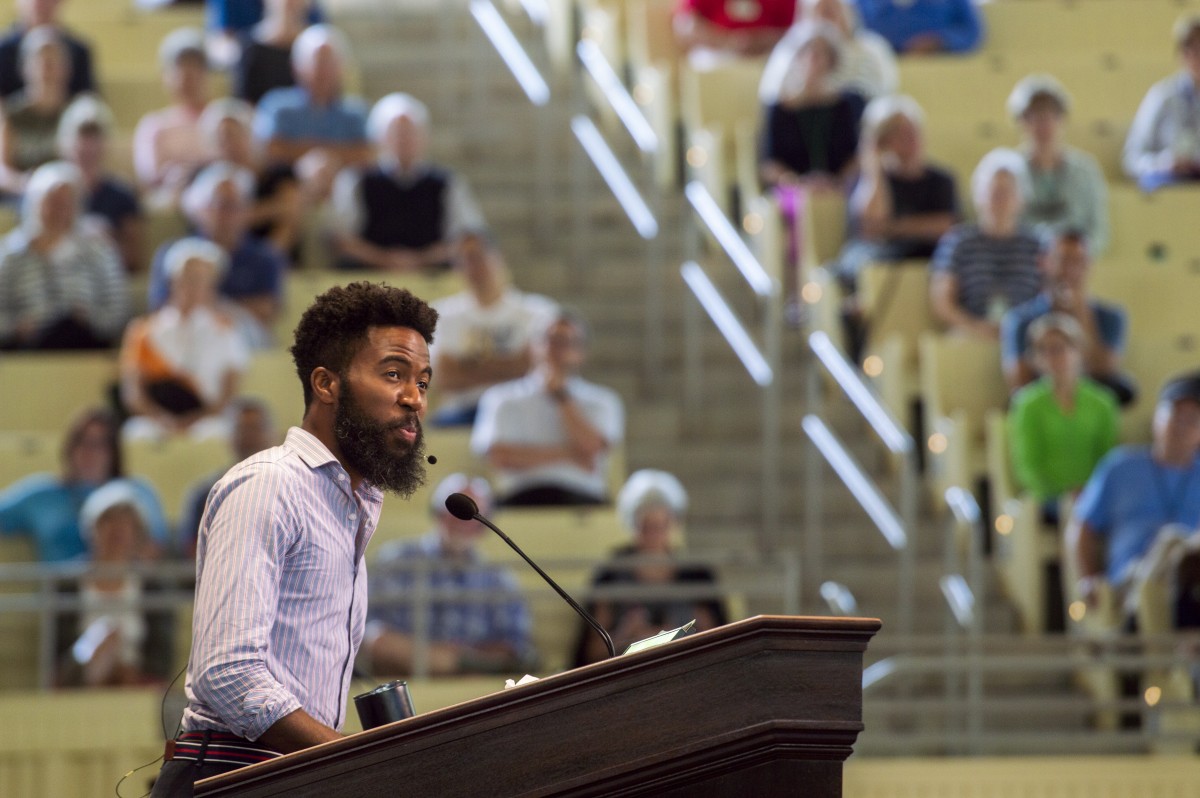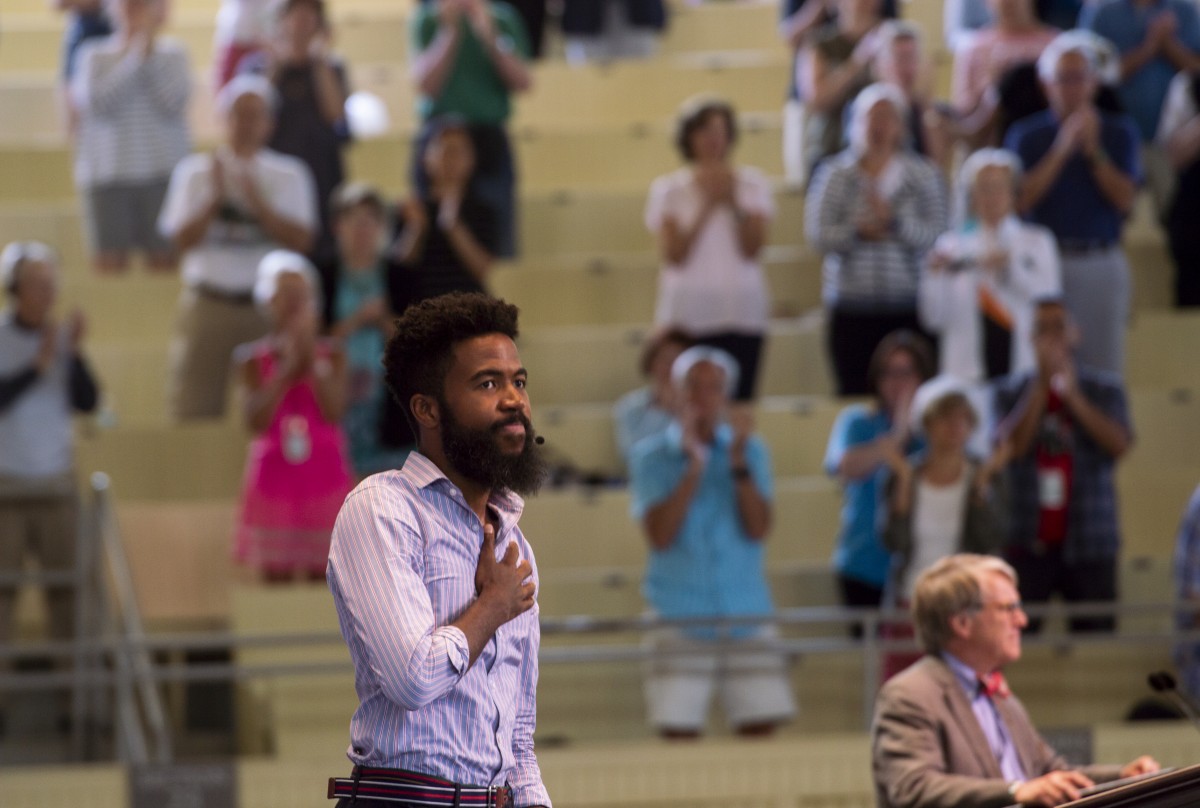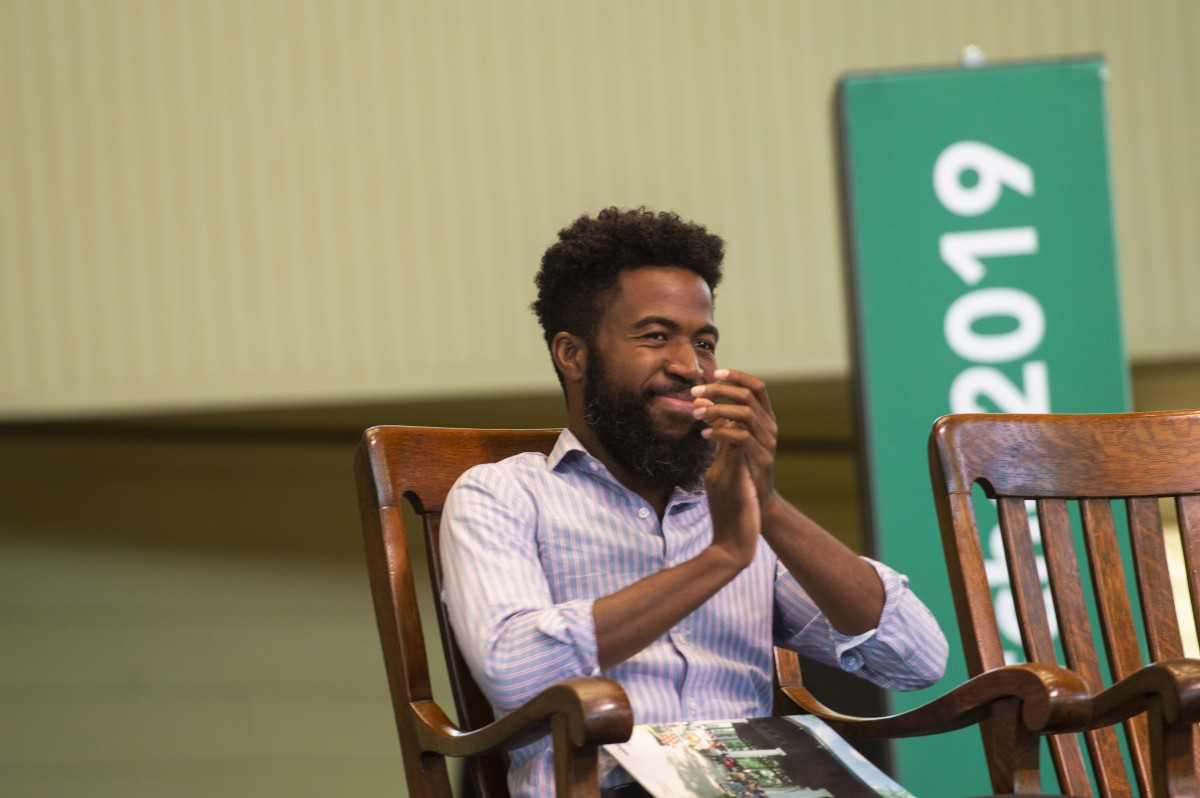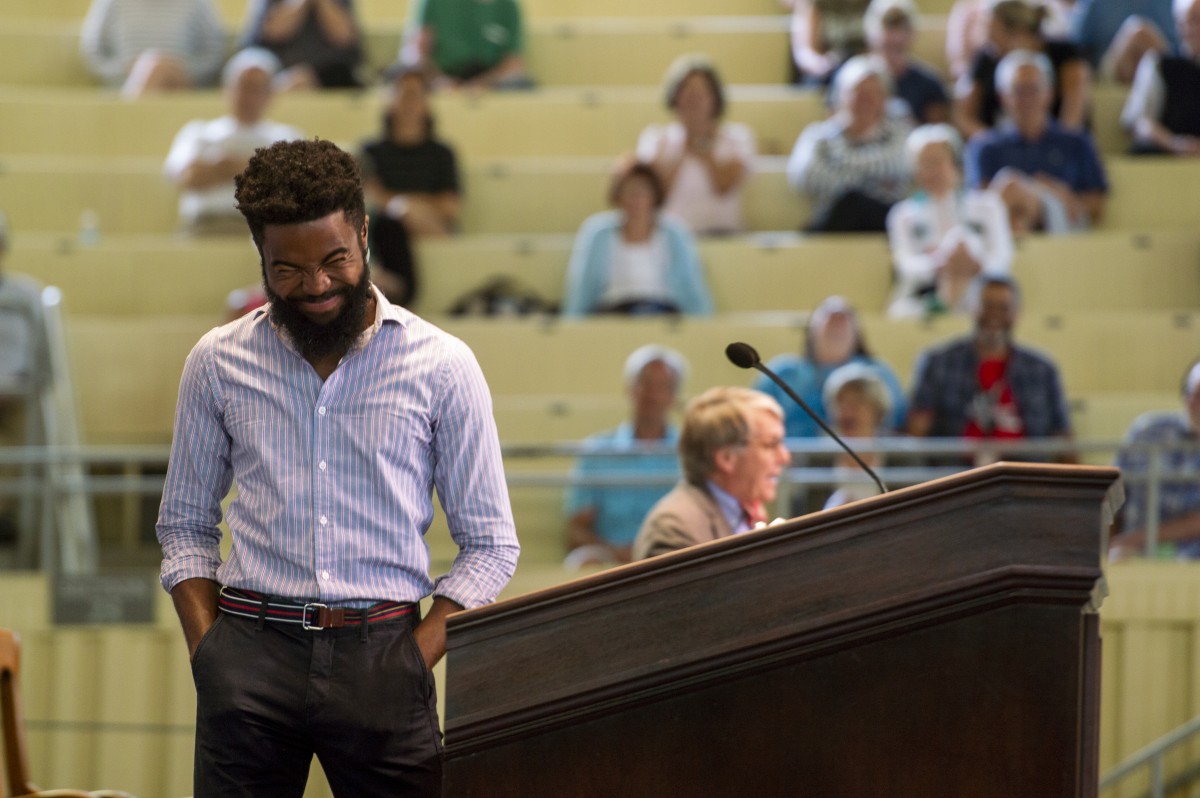A blue whale has a heart the size of a car.
It’s a fact, but to Joshua Bennett, it’s also a metaphor for love, a love as big as a Volkswagen Beetle. A fact, a metaphor and also an example — embodying how Bennett has learned to sing what others only say.
Bennett, an NAACP Image Award nominee and assistant professor of English and creative writing at Dartmouth College, closed Week Five, “The Life of the Spoken Word,” at 10:45 a.m. Friday in the Amphitheater. A majority of Bennett’s lecture was delivered in an extended question and answer period, but before that, he performed five of his poems.
Bennett wrestled with how to deliver his lecture, but decided that eccentric, theatrical interpretations of his poems would do their messages more justice than anything else.
“To me, it matters when you see a flesh-and-blood person before you, because it’s almost a reminder of what’s possible,” said Bennett, author of Algorithm and Blues, The Sobbing School and three forthcoming works: Owed, Being Property Once Myself: Blackness and the End of Man and Spoken Word: A Cultural History. “This is ancient; what we’re doing here. This is the oldest tradition in the Western world, this oral poetry. The ancient Greek poems taught in school, they began as performances. I don’t think we’ve ever lost that, but I think we need to recover that memory.”
Bennett’s poems serve as an outline of his journey, not just as a spoken word artist, but also as an educator. His career did not begin in formal institutions like the places he performs now, but instead, bloomed in middle-school cafeterias in the South Bronx and in his parents’ dining room, where he would perform church sermons starting at just 4 years old.
“My family, in all their kindness, would listen, and that taught me something as a very small boy, which is that words have power,” Bennett said. “Whatever the power was that happened on Sunday mornings that had people cartwheeling, running and laughing and crying, I knew that I wanted that and the spoken word became part of my way of capturing that.”
The first poem he performed was “Say it, Sing it if the Spirit Leads,” which he wrote in the summer of 2012 for the very first class he ever taught, a class of nine elementary school students whom he urged to love their blackness, for “their beauty is not a burden.”
“Say it / That every single day is a toast to living / an ode to the way we make survival an art. / My classroom is a self-love anthem in nine parts. / Together we unlove shame, we dream silly, we sing what we cannot say anywhere else. … We will honor the dead / praise what they left behind / No one can make us afraid of being alive. / My people stay alive, they always have. / Say ‘always have.’ / Say ‘always will.’ ”
@SirJoshBennett started off by reciting a poem. He said the best way to show spoken word, would be to give us examples of spoken word. #CHQ2019 pic.twitter.com/yqHXAtbCQw
— The Chautauquan Daily (@chqdaily) July 26, 2019
Long before he wrote that poem, he was a student at the University of Pennsylvania. Before Bennett could graduate, he had to conquer his science credit requirement, and since Moby Dick was his favorite novel and Jonah and Noah were his “guys,” he figured oceanography would suffice.
Bennett doesn’t remember anything from that oceanography class, other than the fact that blue whales have car-sized hearts.
“What I knew, even as a 21-year-old who was in serious fear of not graduating, was that I one day wanted to give someone a love that big,” he said.
Thus, his poem “Balaenoptera” was born.
“And maybe, if you asked me to, I would crawl through the veins of a blue whale on my hands and knees, photograph that Volkswagen-sized heart of hers and place the picture on your pillow before you went to sleep,” Bennett recited. “When you ask me about it, I’ll probably just laugh, giggling, like I’ve got a handful of diamonds in my throat and say, ‘See, I told you / the biggest heartbeat God ever made, and now, it’s all yours.’ ”
As Bennett continued to write and improve, more opportunities came his way outside of the classroom, like when he was invited to perform at the White House Poetry Jam in 2009. Bennett’s mother came to the White House with him and — with the best of intentions — she pushed Secret Service out of the way to meet Michelle Obama, telling her she taught Bennett everything he knows. Bennett wouldn’t attribute his talent to her, but does give her credit for his ability to use it.
“I don’t get it from her,” he said. “She’s not a poet, but she is incredible and she raised me to believe in my voice and the power of what language can do.”
Alongside his mother, Bennett’s greatest inspirations were his teachers. One in particular is Ms. Simms, who “transformed” his life.
“Ms. Simms saw me; she saw a ton of potential and she invested a lot of her time,” he said. “Whenever I step in front of my lecture hall in Dartmouth, I think about her, and I think about every teacher that saw a kid that didn’t have a great shot at the beginning, believed I could be whatever I wanted, told me so to my face and followed through.”
In her honor, Bennett performed, for the first time, “Owed to the 10th Grade English Teacher.”
“Of course, you were not my mother. / But you were fashioned from the same star-shined fabric as she / and you wore your historical brilliance that way,” he said. “Ms. Simms, first of her name, breaker of generational curses and systemic self-doubt, lover of Motown, advocate of boys and girls hailing from the underground of this world of access and wealth / those of us who are not supposed to be anywhere near the great American canyon … in spite of it all, you dared to call us possible. / And so we were.”
Through teaching at Dartmouth, Bennett has become a mentor himself, but creating poetry is a very different process for students now than it was when he was growing up. According to him, his students are more “cautious and judicious” about the things they say, given how the internet documents their lives in a way they can’t escape from.
Bennett sees where his students are coming from, but thinks living in that fear is holding them back.
“If you want to talk, you should talk,” he said. “You have to be courageous in our speech, we have to take care of each other and we have to forgive each other too as a fundamental principle. I was away from the church for a long time, but what I could never relinquish was this basic principle of mercy. Mercy is the goodness we don’t deserve.”
“Every poem I write, I want it to feel like a conversation… I also wanted to have the music of those first preachers I heard…” – Bennett #CHQ2019
— The Chautauquan Daily (@chqdaily) July 26, 2019
In addition to being more cautious, Bennett said college students are also more “well-read” and invested in creating social change than ever before.
“College students, I think, are really misrepresented right now in the public sphere,” he said. “In office hours, my students have questions about their moral compass: ‘How can I be a decent person?’ ‘How can books help me do that?’ They don’t ask about their GPAs; they want to know how to make the world better, and that’s what a university is supposed to be for.”
Like his Dartmouth students, Bennett had questions of his own as a student at Princeton University. When he graduated from Princeton, he was shocked by the way people used the language of diversity and inclusion “to not see each other.”
“I would go to give a job talk or a lecture and people would say, ‘Oh, are you the new diversity hire?’ and I would say, ‘No, I’m Joshua, actually,’ ” he said.
To exemplify human difference, Bennett performed “Token Sings the Blues.”
“You contain multitudes and are yet contained everywhere you go / confined like there is always someone watching you / And isn’t there?” he spoke. “And isn’t that the entire point of the flesh you inherited? / This unrepentant stain? / ‘Be twice as good,’ mama says, as if what they have is worth your panic, worth measuring your very life against / And you always remember to measure.”
Bennett’s next poem was an ode to his father, a man born in “Jim Crow Alabama” who grew up in the shrapnel of American history. He desegregated his high school and served in the Vietnam War, never considering himself the hero of his life’s stories. In fact, loneliness was his principal emotion.
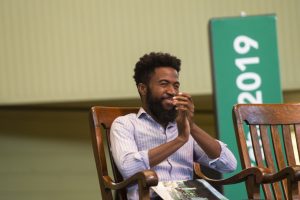
To paint a picture of optimism in the midst of survival, Bennett performed “America Will Be.”
“He witnessed firsthand the firebombs / the Klan and multiple messiahs,” he recited. “Love soaked and shot through / somehow still believes in this grand blood-stained / experiment till votes still prays that his children might / make a life unlike any he has ever seen. He looks / at me like the promise of another cosmos and I never / know what to tell him. / All of the books in my head have made me cynical and distant, but there’s a choir / in him that calls me forward …”
Throughout his life, Bennett believes he inherited some of his father’s optimism and attributes maintaining that positive outlook to his students.
“Who will tell the children there’s no hope?” he said. “They are already running toward hope every single day. So, I believe in the future because I believe in us, I believe in our collective capacity to make things different. I am the product of that truth.”
In addition to his parents and teachers, Bennett takes inspiration from an ever-growing list of poets who came before him, such as Sunni Patterson, Amiri Baraka and Gwendolyn Brooks.
“(Brooks was) not just an orator and writer but someone who believed that her poems could go anywhere,” he said. “She was a Pulitzer Prize winner who would teach poetry workshops in the basement of a church, so she’s an inspiration to me to take poems wherever people are.”
Above all, taking poems “wherever people are” requires Bennett to communicate to his audience with care — and always truthfully.
“I try to remind myself every time I step on the page that I have an ethical demand upon my life to be honest,” he said. “I try to say no matter what, no matter how this audience receives what I’m about to say, I owe it to them and I owe it to myself to come with the whole portrait of who I am; that way if it’s accepted, or it’s rejected, it’s on my own terms.”
“I don’t know how to define poetry in a sense, but if I hear something and I feel it, it’s a poem.” – Bennett #CHQ2019
— The Chautauquan Daily (@chqdaily) July 26, 2019


